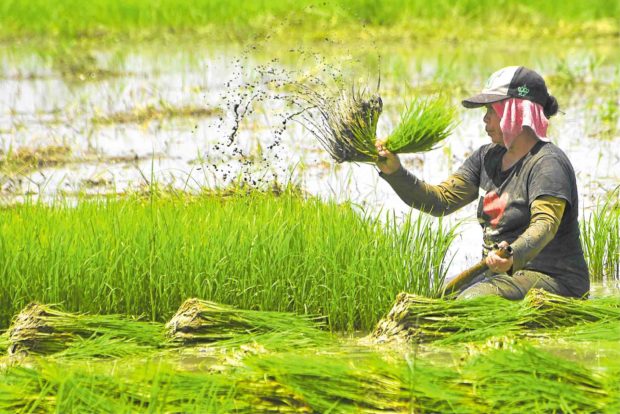
FARM-CENTRIC A farmer in Pangasinan province prepares for rice planting. Agriculture as a profession should appeal to young generations, according to Education Secretary Leonor Briones. Willie Lomibao
LOS BAÑOS, LAGUNA—Agriculture should be integrated into basic education programs to encourage young people to take it as a profession, according to Education Secretary Leonor Briones.
In her address during the investiture of Glenn Gregorio as the 11th director of the Southeast Asian Regional Center for Graduate Study and Research in Agriculture (Searca) here on Monday, Briones emphasized the need to interest students on agriculture.
“Agriculture as a profession is not particularly sexy to young people,” she said. “There is a [decline] not only in the productivity of agriculture but [also in] the interest of young people themselves. And the only way perhaps is to start making agriculture sexy as early as basic education.”
She added: “I believe that teaching agriculture to college students at the tertiary level will be already a little too late. We have to develop a passion, an interest, and excitement for agriculture at the basic education level.”
Some public elementary schools are already implementing a “Gulayan sa Paaralan” or school gardens, similar to Searca’s school plus home gardens project, but Briones said such projects had to be done countrywide.
“Even though there is great interest among students in science, technology, engineering and mathematics, many do not realize that these are also in agriculture itself,” she said.
“You need accounting in agriculture. You need entrepreneurship also in agriculture. But this is not noticed,” she said.
Research findings from institutions such as Searca, a nonprofit organization established by the Southeast Asian Ministers of Education Organization, could be used in teaching agriculture, Briones said.
Part of curriculum
“At the Department of Education, we are much more interested in seeing to it that the very impressive researches done all over Southeast Asia, not just in the Philippines, by scholars in agriculture be translated into the curriculum for basic education [to promote] interest in agriculture—as something as exciting as robotics,” she said.
According to her, research findings should also benefit the small stakeholders.
“Such research findings should not only be utilized by big agricultural companies. Our graduates should not only work for the big agricultural companies in other countries but also think in terms of small-island agriculture because after all we have 7,100 islands and a good number of them are small islands. And so we have to initiate innovative and sound policy reforms,” she said.
Farming as business
For Gregorio, rice farming and agriculture should be viewed as a business.
“Agriculture, you look at production. That’s only 12 percent. If you look at the services, postharvest, processing, the whole value chain, it’s already 39 percent. They don’t count those [in],” said Gregorio, a National Academy of Science and Technology academician and University of the Philippines Los Baños professor.
Aside from looking at agriculture as a business, public perception of what a farmer is should also be changed, according to Gregorio.
“If a farmer is shown, he is usually planting or with missing teeth. That’s not a farmer. That’s a farmworker. The farmer is the one who counts money and pays [the farmworkers],” he said.
Smart
Contrary to popular belief, farmers are “actually smart and should be taught how to do business,” he said. “If they don’t know how to do business, they won’t be able to loan. They have to know how to make their books,” he said.
To be able to empower rice farmers, Gregorio said the government should provide them with machinery so that they could process their crops.